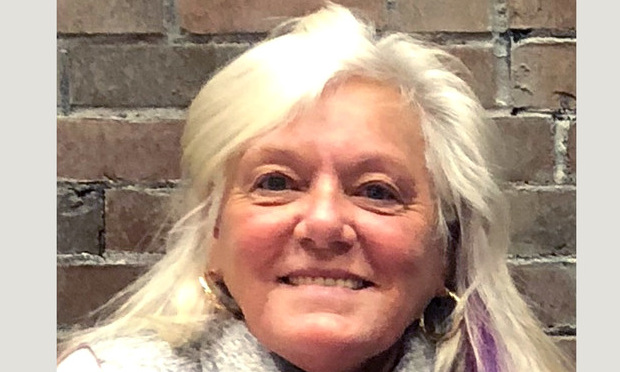5 Lawyers Who Won Big in 2018
The year saw numerous multimillion-dollar verdicts and settlements in Connecticut. Here are the top five.
December 19, 2018 at 05:35 PM
7 minute read
 Barbara Izzarelli was awarded $8 million in punitive damages, upping what she is owed from R.J. Reynolds Tobacco to $52.3 million.
Barbara Izzarelli was awarded $8 million in punitive damages, upping what she is owed from R.J. Reynolds Tobacco to $52.3 million.
This year saw some explosive jury verdicts and settlements on a variety of topics, most having to do with death, injury, malpractice or motor vehicle cases.
The largest verdict in Connecticut—by far—was last week's ruling by a federal judge in the case of a longtime smoker against R.J. Reynolds Tobacco. In that case, U.S. District Judge Stefan Underhill upped the punitive damages to $8 million, bringing the total award to $52.3 million.
Here is a tally by the Connecticut Law Tribune of five of the top verdicts and settlements, and a look at the attorneys who secured these victories.
$52.3 Million Won by Attorney David Golub of Silver Golub & Teitell:
Barbara Izzarelli won a suit against tobacco giant R.J. Reynolds in 1999, claiming injury from smoking Salem cigarettes over 25 years.
On Dec. 13, Underhill finalized the punitive damages that R.J. Reynolds will have to pay Izzarelli, a former Connecticut resident who now lives in Florida. He set punitive damages at $8 million in the case, bringing the total amount owed Izzarelli to $52.3 million. The case has gone through several courts since a 2010 federal jury awarded Izzarelli $7.9 million. While the cigarette maker is expected to appeal, attorney David Golub told his client that he hopes the case will, finally, be wrapped up by 2019.
A partner with Stamford's Silver Golub & Teitell, Golub said there were two principal challenges/obstacles he had to overcome. First, he said, was that Connecticut law was largely unsettled with respect to product liability standards applicable to cigarettes design cases. Second, Golub said, was that jurors had strong feelings, both pro and con, about smoking and smokers. R.J. Reynolds, and other cigarette makers, he noted “have spent millions of dollars promoting public relations campaigns about personal choice and arguing that individuals who choose to smoke are responsible for their own injuries.”
Izzarelli began smoking at age 12. She underwent a total laryngectomy, followed by radiation and chemotherapy treatments. She can no longer breathe through her mouth or nose and uses a tube in her throat.
Golub was assisted in the case by colleagues Jonathan Levine and Marilyn Ramos.
$13.6M Won by Jerry McEnery of McEnery Price Messey & Sullivan:
Attorney Jerry McEnery secured a $13.6 million settlement for a Wallingford woman severely injured in a motorcycle crash that killed her fiance. A big part of the victory was due to the dash cam footage which showed the driver of the garbage truck that struck the motorcycle was not paying attention.
Allison Vandermaelen was a passenger on a motorcycle with Raymond Smith when it collided in July 2016 with a garbage truck operated by a man who crossed into oncoming traffic, according to the lawsuit. Smith died instantly while Vandermaelen suffered a traumatic brain injury and underwent 22 surgeries on her left leg.
In addition to the dashcam footage, McEnery said it was important to put a face to the name Allison Vandermaelen. In doing so, McEnery worked with an outside company to film a day in the life of Vandermaelen and her then-17-year-old daughter, Jenna.
“It was very powerful,” he said. “All of the insurance companies and the mediator were impressed with both women.”
Assisting McEnery were colleagues Gayle Sullivan, Charles Price Jr., and Robert Messey
$8.39 Million Won by Michael Burrell of Adelman Hirsch & Connors:
There were several layers to lawyer Michael Burrell's representation of client Schley Hunter, who was left a quadriplegic following a 2016 rollover of the box truck.
Hunter was a passenger in the truck in which the driver is said to have fallen asleep at the wheel, thus losing control of the vehicle. The truck hit 50 yards of guardrail and flipped over on its right side after striking a large rock on the side of the road. Hunter was then struck by a tractor-trailer traveling 50 miles per hour as he tried to help the driver of the box truck to safety.
Burrell, a partner with Bridgeport-based Adelman Hirsch & Connors, got a $1 million recovery against the tractor-trailer truck and $1.295 million against the operator of the box truck. There were also a negligence claims and a workers' compensation settlement for a total payout of $8.39 million.
$5 Million Won by James Bergenn of Shipman & Goodwin:
James Bergenn believes defense attorneys agreed to pay $5 million to his client, a bicyclist whose leg was amputated after a truck collision, because “we were going to kill them at trial.”
Bergenn, a partner with Shipman & Goodwin in Hartford, told the Connecticut Law Tribune, “We had a guy [the driver of the truck] who gave the wrong name to police and not only did not have his [commercial driver's license], but he also did not even have a Connecticut driver's license. He was also in the U.S. unlawfully.”
Bloomfield resident Michael Galikas was riding his bicycle when he was sideswiped by a 33,000-pound box truck. He was in an induced coma and had his left leg amputated because the truck's rear wheels ran over his legs. Galikas got the $5 million settlement from the truck's insurance carrier.
The lawsuit on behalf of Galikas named truck driver Antonio Giron Santiz and his employer, East Windsor-based Baggott Family Farms, as defendants. “The company is also at fault,” Bergenn said. “They did not vet him like they should have.”
Bergenn was assisted by colleague William Ronalter, who was the lead plaintiff attorney on the case.
$3.8 Million Victory by Attorney Michael Jainchill of RisCassi & Davis:
Attorney Michael Jainchill helped secure a $3.8 million settlement in a wrongful death lawsuit against a speeding motorist that struck a vehicle head-on, killing 66-year-old grandmother Janet Pulver.
Jainchill, a partner with Hartford's RisCassi & Davis, reached the settlement on behalf of Pulver's two grown children. One of Jainchill's biggest obstacles was to establish the value of loss, which was made harder because Pulver had not been gainfully employed outside the home since her children were born.
“Once her kids were grown and with children of their own, she chose to provide day care services to her grandchildren so that the parents could work and not have to incur child care expenses,” Jainchill said. “We used that cost as a basis to try to establish the economic value of her activities. However, it was arguable as to whether that would be an appropriate element of damages for a jury to consider if the case were to be tried.”
Related Stories:
Federal Judge Hikes Punitive Damages in Cigarette Case for Total $52.3 Million Award
Family of Man Killed in Motorcycle Crash Settles for $13.6M
Waterbury Man Left Paralyzed From Truck Accident Settles for $5.49M
Hartford Lawyer Gets $5M for Bicyclist Whose Leg Was Amputated After Truck Collision
Family of Avon Woman Killed in Head-On Crash Settles Case for $3.8M
This content has been archived. It is available through our partners, LexisNexis® and Bloomberg Law.
To view this content, please continue to their sites.
Not a Lexis Subscriber?
Subscribe Now
Not a Bloomberg Law Subscriber?
Subscribe Now
NOT FOR REPRINT
© 2025 ALM Global, LLC, All Rights Reserved. Request academic re-use from www.copyright.com. All other uses, submit a request to [email protected]. For more information visit Asset & Logo Licensing.
You Might Like
View All
'Battle of the Experts': Bridgeport Jury Awards Defense Verdict to Stamford Hospital
3 minute read
Settlement Allows Spouses of U.S. Citizens to Reopen Removal Proceedings
4 minute read
Judge Awards Over $350K in Attorney Fees in Data Breach Class Action Settlement
3 minute readTrending Stories
- 1Corporate Litigator Joins BakerHostetler From Fish & Richardson
- 2E-Discovery Provider Casepoint Merges With Government Software Company OPEXUS
- 3How I Made Partner: 'Focus on Being the Best Advocate for Clients,' Says Lauren Reichardt of Cooley
- 4People in the News—Jan. 27, 2025—Barley Snyder
- 5UK Firm Womble Bond to Roll Out AI Tool Across Whole Firm
Who Got The Work
J. Brugh Lower of Gibbons has entered an appearance for industrial equipment supplier Devco Corporation in a pending trademark infringement lawsuit. The suit, accusing the defendant of selling knock-off Graco products, was filed Dec. 18 in New Jersey District Court by Rivkin Radler on behalf of Graco Inc. and Graco Minnesota. The case, assigned to U.S. District Judge Zahid N. Quraishi, is 3:24-cv-11294, Graco Inc. et al v. Devco Corporation.
Who Got The Work
Rebecca Maller-Stein and Kent A. Yalowitz of Arnold & Porter Kaye Scholer have entered their appearances for Hanaco Venture Capital and its executives, Lior Prosor and David Frankel, in a pending securities lawsuit. The action, filed on Dec. 24 in New York Southern District Court by Zell, Aron & Co. on behalf of Goldeneye Advisors, accuses the defendants of negligently and fraudulently managing the plaintiff's $1 million investment. The case, assigned to U.S. District Judge Vernon S. Broderick, is 1:24-cv-09918, Goldeneye Advisors, LLC v. Hanaco Venture Capital, Ltd. et al.
Who Got The Work
Attorneys from A&O Shearman has stepped in as defense counsel for Toronto-Dominion Bank and other defendants in a pending securities class action. The suit, filed Dec. 11 in New York Southern District Court by Bleichmar Fonti & Auld, accuses the defendants of concealing the bank's 'pervasive' deficiencies in regards to its compliance with the Bank Secrecy Act and the quality of its anti-money laundering controls. The case, assigned to U.S. District Judge Arun Subramanian, is 1:24-cv-09445, Gonzalez v. The Toronto-Dominion Bank et al.
Who Got The Work
Crown Castle International, a Pennsylvania company providing shared communications infrastructure, has turned to Luke D. Wolf of Gordon Rees Scully Mansukhani to fend off a pending breach-of-contract lawsuit. The court action, filed Nov. 25 in Michigan Eastern District Court by Hooper Hathaway PC on behalf of The Town Residences LLC, accuses Crown Castle of failing to transfer approximately $30,000 in utility payments from T-Mobile in breach of a roof-top lease and assignment agreement. The case, assigned to U.S. District Judge Susan K. Declercq, is 2:24-cv-13131, The Town Residences LLC v. T-Mobile US, Inc. et al.
Who Got The Work
Wilfred P. Coronato and Daniel M. Schwartz of McCarter & English have stepped in as defense counsel to Electrolux Home Products Inc. in a pending product liability lawsuit. The court action, filed Nov. 26 in New York Eastern District Court by Poulos Lopiccolo PC and Nagel Rice LLP on behalf of David Stern, alleges that the defendant's refrigerators’ drawers and shelving repeatedly break and fall apart within months after purchase. The case, assigned to U.S. District Judge Joan M. Azrack, is 2:24-cv-08204, Stern v. Electrolux Home Products, Inc.
Featured Firms
Law Offices of Gary Martin Hays & Associates, P.C.
(470) 294-1674
Law Offices of Mark E. Salomone
(857) 444-6468
Smith & Hassler
(713) 739-1250











